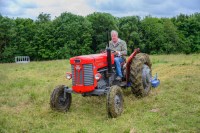Fly-grazing will be discussed for two hours in Parliament this afternoon. But what is it – and why should the government care? Put simply, fly-grazing is the unauthorised grazing of land by equines. Or, as Defra puts it, ‘the practice of leaving horses to graze on public or private land without the permission of the owner or occupier.’ Essentially, it’s the equine version of being a squatter.
This afternoon the Environment, Food and Rural Affairs Committee will take evidence on the topic, after Julian Sturdy MP put forward a Control of Horses Bill that will have its second reading in October. But are irresponsible horse owners something that the government really ought to be worrying about? Well, someone needs to tackle the problem, and if Defra won’t do it, who will?
Over the last few years, the number of horse welfare cases has increased dramatically, and so has the number of abandoned or fly-grazed horses. Calls to the RSPCA about fly-grazed horses, for example, rose by 66 per cent between 2010 and 2013.
The main problem is that landowners have very little power to remove a horse from their land. None of the current legislation in England allows a person to remove an equine from their land before it has been there for 14 days (by which time it is classed as abandonment), which causes huge problems financially and legally for landowners, be they local authorities or members of the public. One council reported having spent over £100,000 on the problem in one year. And, since the UK has no equine database (although there is one for sheep), and many aren’t micro-chipped, it’s nigh-on impossible to connect a horse with its owner.
It’s a nationwide problem as well – in a survey earlier this summer, only 23 per cent of local authorities reported having no fly-grazing problems at all. And the fact that the RSPCA, the Countryside Alliance, the National Farmers Union, the CLA and World Horse Welfare have joined forces to write a report on the topic shows that a huge proportion of landowners and horse owners would support changes to the law.
So what can be done? At the beginning of the year the Welsh Assembly brought in its own Control of Horses Act, which gave greater powers to local authorities, and has solved many of the country’s fly-grazing problems. But, to quote Henry Robinson of the CLA, ‘the very real concern is that this problem will simply migrate, concentrating the problem in England’. This already appears to be happening – World Horse Welfare have reported that the numbers of fly-grazed horses in England have grown since January, but are on the decrease in Wales.
Jenny MacGregor, who founded the Society for the Welfare of Horses and Ponies, argues that the real issue is the irresponsible breeding of horses – something that other equine charities (and Princess Anne) have tried to tackle in the past. ‘We need the licensing of stallions so there is better control, a re-introduction of the equine database which was dismantled by Defra, and for people to stop and think about breeding’, she said. ‘It just doesn’t make sense to breed when there is no market.’
If people can’t be persuaded not to over-breed horses, however, then it appears that new laws might be the only solution.







Comments